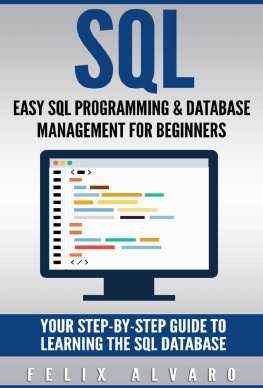Alvaro - SQL for Beginners
Here you can read online Alvaro - SQL for Beginners full text of the book (entire story) in english for free. Download pdf and epub, get meaning, cover and reviews about this ebook. year: 2016, genre: Computer. Description of the work, (preface) as well as reviews are available. Best literature library LitArk.com created for fans of good reading and offers a wide selection of genres:
Romance novel
Science fiction
Adventure
Detective
Science
History
Home and family
Prose
Art
Politics
Computer
Non-fiction
Religion
Business
Children
Humor
Choose a favorite category and find really read worthwhile books. Enjoy immersion in the world of imagination, feel the emotions of the characters or learn something new for yourself, make an fascinating discovery.
SQL for Beginners: summary, description and annotation
We offer to read an annotation, description, summary or preface (depends on what the author of the book "SQL for Beginners" wrote himself). If you haven't found the necessary information about the book — write in the comments, we will try to find it.
Alvaro: author's other books
Who wrote SQL for Beginners? Find out the surname, the name of the author of the book and a list of all author's works by series.
SQL for Beginners — read online for free the complete book (whole text) full work
Below is the text of the book, divided by pages. System saving the place of the last page read, allows you to conveniently read the book "SQL for Beginners" online for free, without having to search again every time where you left off. Put a bookmark, and you can go to the page where you finished reading at any time.
Font size:
Interval:
Bookmark:
Easy SQL Programming & Database Management For Beginners. Your Step-By-Step Guide To Learning The SQL Database.
Felix Alvaro
Firstly, I want to thank God for giving me the knowledge and inspiration to put this informative book together. I also want to thank my parents, my brothers and my partner Silvia for their support.
- History of SQL
- Uses of SQL
- People Using SQL
- Database Fundamentals
- Relational Database Fundamentals
- Database Management Systems
- SQL Fundamental Features
- SQL Command Types
- SQLite Database Features and Installation Instructions
-
- Definition of Data
- Types of Data
- User-Defined Data Type
- CREATE Statement
- ALTER Statement
- DROP Statement
- INSERT Statement
- UPDATE Statement
- DELETE Statement
- SELECT Statement
- WHERE Statement
- ORDER BY and GROUP BY Statements
- COMMIT Command
- ROLLBACK Command
- SAVEPOINT Command
- Defining Views
- Creating Views
- Dropping Views
- Assigning Primary and Foreign Keys
- Understanding Indexes
- Normalizing Databases
- Cursors
- Triggers
- Errors
- Recap and Final words
- Check out my other books
Copyright 2016 by D.A.Alvaro - All rights reserved.
This document is geared towards providing exact and reliable information in regards to the topic and issue covered.
It is not legal to reproduce, duplicate, or transmit any part of this document in either electronic means or in printed format. Recording of this publication is strictly prohibited.
Hi there! Thank you so much for downloading this eBook in SQL Programming and Database Management for Beginners. I assure you that you have made a wise decision in investing in your skills as a database professional. This eBook will teach you vital information on the fundamentals of database programming and management using one of the powerful software tools the SQL language. I am Felix, who also started as a simple analyst and now progressing into becoming a database scientist. Through the guidance of this eBook, you will have a better understanding of the countless opportunities that this SQL language can bring you. I will be presenting you step-by-step instructions in learning the essential skills of this reliable database software.
At first, I did not realize how important it is for one to comprehend SQL if there are other program applications you can use, such as Microsoft Excel, to process and present information. When I started researching for the value of SQL, I told myself that if I continue embarking on this field then I will not just be presenting information but analyzing data as well. After downloading and installing the software, I have found out that it is not that challenging to study SQL programming after all! Taking that first step to understanding the basic database concepts will lead you to expanding your knowledge in becoming one of the most sought-after IT professionals.
The current trend in information technology is to be more digital, which entails manipulating databases. This is where SQL comes in place a software language that is powerful yet simple, flexible, portable and, most of all, integrated into numerous database applications. Deciding to become a database professional will definitely promise you a secured job with a potential high remuneration. On the average, a simple database analyst in the United States earns an annual salary of around $92,000 USD.
To start your journey in this field of database programming and management, let this eBook serve as your initial guide in educating yourself with the basics of SQL. I will provide you an overview of how the language started, the various features of the software and its environment, the different commands and functions, the available error-handling tools, some advanced topics and many more! My ultimate aim is for you to appreciate the potentials of SQL and grasp the programming concepts in a cool way. So what are you waiting for? Let us get started!
In this chapter you will learn a brief background on how and why SQL came into existence. Gaining knowledge on the history of this computer language will help you understand its importance to most IT professionals who focus on the field of data manipulation. You will also have an idea on how to maximize the potentials of SQL in the ever-changing world of Information Technology.
The current trend in most businesses today is to invest in technology that will gather data in the most efficient and effective way. However, gathering information is only the start of the extensive process of data manipulation. Companies, especially multi-national ones, require experts who possess the skills of analyzing, presenting, managing and storing data. In other words, they need to use computer programs that will transform raw company data to useful information. Now, thanks to Structured Query Language , or simply SQL , that brought about such transformation in accessing and manipulating data in a very meaningful way.
History of SQL
Pronounced as ees-que-ell or seeqwl , SQL is a computer language initially invented by an American multinational technology and consulting company known as IBM (International Business Machines Corporation) way back 1970s using Dr. E. F. Codds paper on A Relational Model of Data for Large Shared Data Banks for the prototype design. It was originally called SEQUEL (Structured English QUEry Language) that handled queries on the collection and organization of data - or simply known as a database. More features were added to the computer software to improve its performance, like building and managing database security, among others. When IBM researchers learned that there is another company that had the same Sequel trademark, they renamed it to S-Q-L (presently expanded as Structured Query Language ).
Since it was first released to the public, SQL already had many versions. In 1979, Relational Software, Incorporated (which later became the Oracle Corporation) released ORACLE , the first SQL product. Now, as the demand for computers that manage data has increased, the more SQL has become an industry standard in the field of Information Technology. Such formal standard is set and maintained by the International Standards Organization , or simply known as ISO . It was on 1986, based on IBMs implementation, that SQL has been recognized as the standard language in database communication. The following year, ISO accepted ANSI SQL as the international standard. ANSI stands for American National Standards Institute , which is an organization that approves certain standards in various US industries. Many revisions of the standards followed, such as in 1992 (SQL-92) and in 1999 (SQL-99). The latest one is now called SQL-2011, which was officially released in December 2011.
Uses of SQL
The corporate world is now shifting from merely producing products and providing services to investing in digital technologies that handle vast amounts of data, to be transformed to meaningful pieces of information that will generate more profitable income for the company. This is the primary objective of SQL to access and manipulate data that will further lead to business insights. This flexible computer language has been the most widely used communication tool in handling databases (specifically relational databases that will be further discussed in Chapter 3 of this book).
Try to imagine that you are going to a foreign country for a vacation. You may need to learn that countrys language to find your way around as you explore the new place. When you try ask someone for directions, who is local to that place and only speaks the countrys language, then surely you will have a hard time understanding him. In this scenario, the foreign land will be your database in which you need to seek information while SQL is the language that you will use to get what you need from the database.
Font size:
Interval:
Bookmark:
Similar books «SQL for Beginners»
Look at similar books to SQL for Beginners. We have selected literature similar in name and meaning in the hope of providing readers with more options to find new, interesting, not yet read works.
Discussion, reviews of the book SQL for Beginners and just readers' own opinions. Leave your comments, write what you think about the work, its meaning or the main characters. Specify what exactly you liked and what you didn't like, and why you think so.








